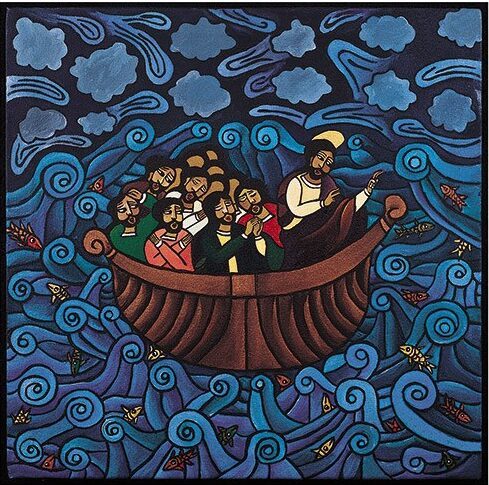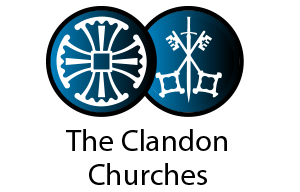
On that day, when evening had come, he said to them, ‘Let us go across to the other side.’ And leaving the crowd behind, they took him with them in the boat, just as he was. Other boats were with him. A great gale arose, and the waves beat into the boat, so that the boat was already being swamped. But he was in the stern, asleep on the cushion; and they woke him up and said to him, ‘Teacher, do you not care that we are perishing?’ He woke up and rebuked the wind, and said to the sea, ‘Peace! Be still!’ Then the wind ceased, and there was a dead calm. He said to them, ‘Why are you afraid? Have you still no faith?’ And they were filled with great awe and said to one another, ‘Who then is this, that even the wind and the sea obey him?’
Mark 4.35–41
What happens when life’s storms get too much for us? There are times for all of us when the wind picks up, when the rain beats down, when the waves get higher and when the tiny vessel of our life seems to be thrown all over the place.
In the reading we heard from Mark’s gospel we find Jesus asleep in a boat on the sea of Galilee, exhausted after being pursued by crowds. As he slept a violent storm erupted, so terrible that even hardy fishermen were terrified. The waves began to engulf the boat and there was real danger of perishing beneath the deep. But Jesus continued to sleep peacefully. In their panic the disciples woke him, shouting ‘Don’t you care? We’re about to sink!’ Jesus stood up and commanded the wind and the sea: ‘Peace, be still’. At once there was calm. Then Jesus said to them: ‘Why are you afraid? Have you no faith?’ And they were filled with awe. ‘Who is this? Even the wind and the sea obey him’ How can this man do the deeds of God?
Their question is left unanswered. But Scripture makes clear what the answer is. In the Jewish biblical tradition, the violent forces of nature – storms, thunder, floods and earthquakes – were all symbols of evil, of demonic powers, all hostile to God. Only God, the creator of all that is, has the power to silence them. And yet here is a man who can command obedience from inanimate nature. Who is he? Can this man be God?
To those who first heard this story, Jesus’ power over the tempest would have been incredibly important. These early Christians were facing a similar storm. The Emperor Nero was savagely persecuting Christians, and many believers were martyred. All this was a trial of their faith every bit as severe as the storm on the Sea of Galilee. To them, it must again have seemed that Jesus was sleeping, and their prayer would have been like the cry of the apostles: ‘Don’t you care? Save us from this disaster!’
The trial, death and resurrection of Jesus had already prepared them for this. The forces of evil had conspired against him, Caiaphas the High Priest cooperating with Pilate the Roman Governor; and the terrified disciples had fled, leaving Jesus alone, passive, like one asleep, to face the ultimate storm of rejection, hatred, torture and death. But when that storm had passed, he was found to have conquered it. The tomb was empty, and he returned to them and said ‘Do not be afraid. Peace be with you’.
The Lord Jesus comes to us still, even at those times when we struggle to hear his voice. Even at those times it looks like he has forgotten. Even when we are tempted to think that he is asleep or doesn’t care, and he calls us to trust him, that he is able to steer our vessel to ultimate safety: the safety of union with God.
St Augustine of Hippo’s shortest sermon is on this text. At the end of the sermon he asked what we should do when the waves seem ready to overwhelm us?
“Wake Christ up!” he said.
“…do not think that the storm will overcome you when you have Christ aboard in your soul… wake up Christ in your heart. Your soul is as a ship, your heart the captain, and Christ your guide. Wake Him up! Do not let your heart be idle when it is in danger. May we live life humbly in search of the Teacher and ask of Him to guide us through all of the dangers of this life.”
During this time of prolonged trial, of disappointment, of irritation at the behaviour of others and frustration at lockdown after lockdown, perhaps a time when money has been unbearably tight, where work has dried up, where the home has felt crowded with work and children and a mound of unfinished tasks, may we remember to open our hearts to Jesus, even when he seems far away, he has not forgotten us. He will come to us and say, ‘do not be afraid. Peace. Be still.’


